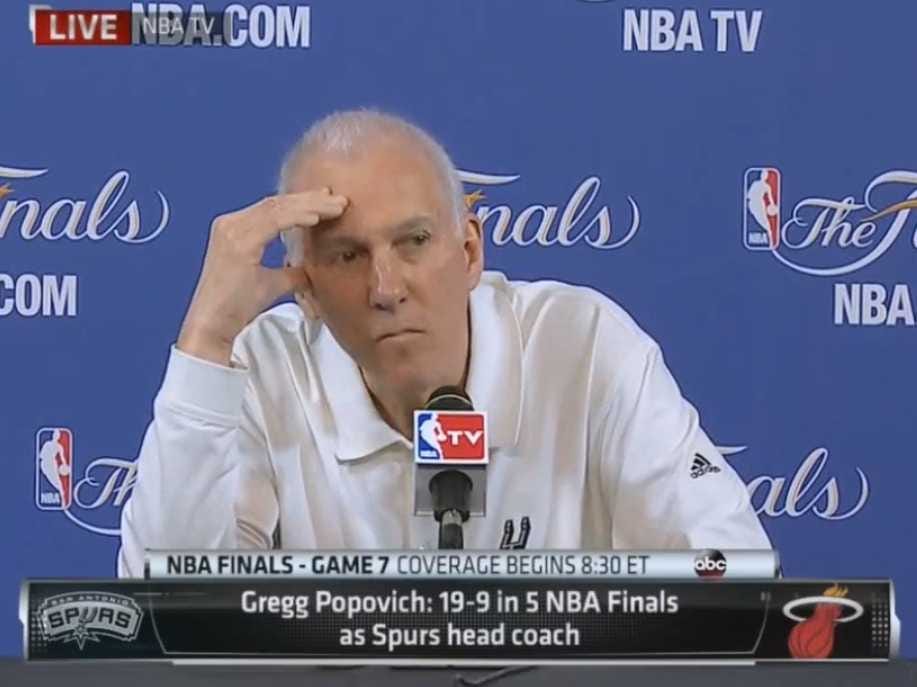You'll need more than a superstar to win a championship
My first love in sports is basketball and specifically the NBA. Most of my season was spent in the bizarro world of the Sixers, where wins were losses and losses were win, as we rooted for the team to tank so that we could get a high lottery pick. Now we wait in suspense as we see how Same Hinkie wiggles his way to one Andrew Wiggins. When I was out of the #tankforwiggens camp, I did enjoy watching some playoff action. The NBA Finals were very entertaining for me and amazingly I learned a lot about leadership through them.
It’ll take more than a hardworking super talent to win. I’ll admit it, I’m not the biggest LeBron James fan, but I

respect his game and feel comfortably crowning him as the best player currently playing (in a few years, he might even be on my top ten), but I knew something was off in game one when the Spurs beat the Heat in San Antonio and LeBron, who has had a history of dehydration and cramping, left the game early when the 90-plus-degree floor rocked him. The Spurs’ arena’s air conditioning was broken and many thought that this was the great disadvantage that LeBron suffered. LeBron is the hardest worker on the court, in my opinion, on both sides of the basketball—and it’s not just because he has to be, it’s also because he’s that talented.
Assembling a talented team is one thing, but getting them to work together is another. Amazingly enough, the Miami Heat are built around LeBron James. I say amazing, because the assembly of this team with three superstars, Chris Bosh, LeBron, and Dwyane Wade, was supposed to create a team that wasn’t so focused on one player, but that’s what ended up happening and that’s what led to the Spurs winning the series in five. The Heat are much more talented than the Spurs, but that didn’t matter because they couldn’t play as a team. LeBron James is a great distributor, he is in fact not a ball hog, but when his teammates were unreliable, he truly had to take matters in his own hands—he scored a game-high 31 in game five of the Finals—but it wasn’t enough to eclipse the Spurs. A great player creates opportunities for his teammates, and LeBron either wasn’t able to do that, or his teammates didn’t know how to take advantage of the opportunities. The Spurs had all of that, not only did their 22-year-old guard, Kawhi Leonard, win the Finals MVP award, their bench scored almost as much as their starters did (47 in game five, compared to Miami’s 24). None of the Spurs wins were even close, they ended up outscoring the LeBron’s dream team by 72 points. The teammates were on the same page, looking out for the same goal, not just personal glory (a rarity in the star-studded NBA).
Leaders build teams. One has to burden Erik Spoelstra, with the mistakes his Miami Heat made. There’s a reason we don’t recognize his name as readily as we do the stars of the Heat. If the rest of eleven players on the Heat weren’t doing their part, that’s all on the coach. I’m not sure exactly if there is a lack of discipline on the squad that Spoelstra emboldened, but when

we compare the Heat to the Spurs we see a different picture. Greg Popowich, who has been coaching the Spurs for eighteen years—longer than any other coach in the U.S.’s four major sports—is considered to be one of the all-time great coaches, and most analysts think that he was coaching a team that possessed inferior talent and certainly was much older than Miami. He coached them so well; he took a team of aging stars (Tim Duncan is now the only player besides John Salley to win a championship in three different decades) and led them to win a championship. Amazingly, the Spurs’ best player, Tony Parker, didn’t even score a point in the first half of the title-clinching game. Popowich’s success over the decades is because he has built a culture that translates no matter who is on his team or where they are from (the Spurs also have the most diverse team in the NBA, with players coming from seven countries). That’s why his bench looks so great, while his starters aren’t the super-stars with the big endorsements.
For me the lesson of all this is to disciple leaders around us. The church is dead if it relies on the charisma and talent of one person. Circle of Hope literally has over a hundred of cell leaders and apprentices, a deep Leadership Team, four full-time pastors, two part-timers, plus two other staff. We have Design Team leaders in each congregation (I think a dozen!), not to mention leaders of compassion, capacity, and mission teams. We have some superstars too, if you ask me, but they generally aren't ball hogs--they distribute the ball well, but know when to shoot too.
We need to deploy leaders and include the next person as actively as we can. It might be tempting to just be that lone leader that saves all of us, because we can’t be Jesus, and even Jesus actively built his team—in fact the first thing he does when he starts in ministry in Mark is find people that are going to do it with him.
One of our pastors, Nate Hulfish, asked us what we could do to jump start transformation. Art, Bryce, and I centered on making disciples, not hogging the ball, and becoming experts at passing the torch. This level of discipleship is all over the scriptures, was littered in the latest book I read, but it was also nicely reaffirmed while watching the NBA Finals.
